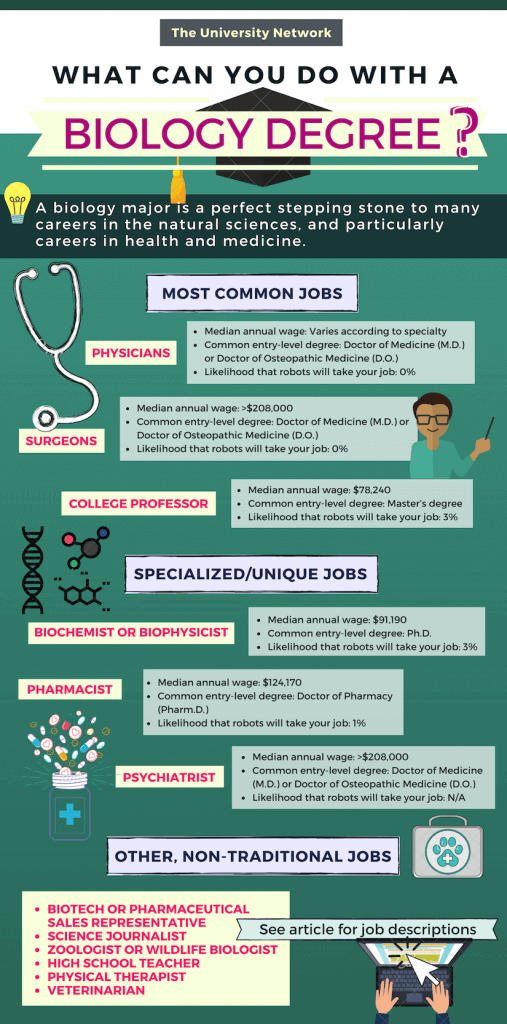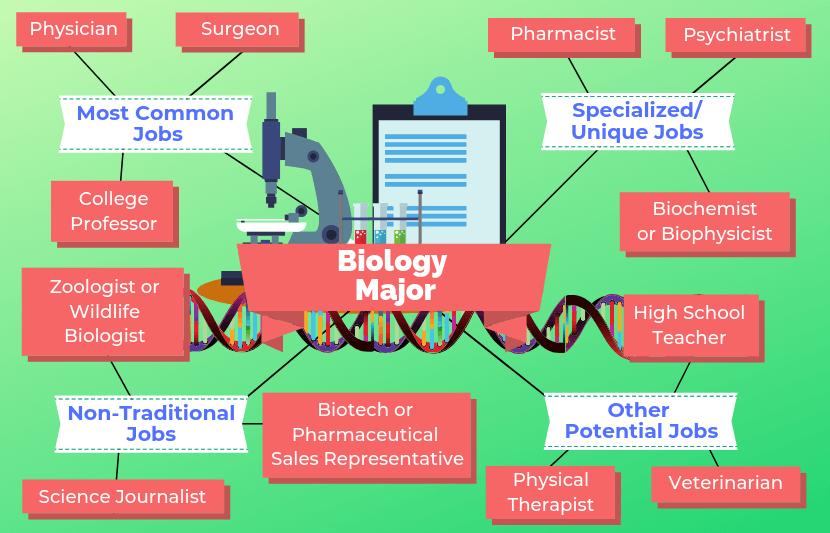A biology major is a perfect stepping stone to many careers in the natural sciences, and particularly careers in health and medicine. Most biology majors end up pursuing careers as doctors and surgeons, a valuable line of work with high levels of job satisfaction, employment prospects, and income. But, even if biology graduates want to study biology and life sciences but aren’t interested in becoming a doctor, fear not. There are plenty of other great jobs that biology students with a biology degree can get.
Biology Major Jobs
Most Common Jobs for Biology Majors

1. Physician
The most common path for biology majors is to become a physician. Physicians, or medical doctors, are professionals who examine and diagnose patients, and treat injury and illness. The term “physician” refers to a wide range of medical practitioners that may include family and general doctors who treat a range of everyday conditions and illnesses, pediatricians who treat children and young adults, general internists who provide nonsurgical treatment for problems that affect internal organs, or a wide variety of specialists who have expertise and treat specific organs or conditions. Becoming a physician requires a lot of time and hard work. After you get your bachelor’s, you’re going to need to take the Medical College Admissions Test (MCAT), attend medical school for 4 years and earn a medical degree, and then complete a residency program, which typically takes 3-7 years depending on your specialty.
Median annual wage: Varies according to specialty; $198,740 for family physician
Common entry-level degree: Doctor of Medicine/Doctor of Osteopathic Medicine degree
Likelihood that robots will take your job:0%
2. Surgeon
Surgeons are specialized physicians who treat diseases, injuries and other ailments by invasive or minimally-invasive surgical operations. Surgeons will examine and diagnose their patients, create a treatment plan, and implement a surgical operation. Oftentimes, they will also provide post-operative assistance or care. Like general physicians, surgeons need extensive education and training in their field. To become a surgeon, you will need to earn a medical degree and complete a surgical residency, which typically takes 5-8 years.
Median annual wage: $208,000
Common entry-level degree: Doctor of Medicine/Doctor of Osteopathic Medicine degree
Likelihood that robots will take your job: 0%
3. College Professor
Many biology majors go on to teach their discipline to the next generation of aspiring doctors, surgeons and biologists. To earn a job teaching at the post-secondary level, a master’s (and sometimes a doctoral degree or medical degree) is required. In addition to teaching, many college professors also do research and write scholarly articles.
Median annual wage: $78,240
Common entry-level degree: Master’s degree
Likelihood that robots will take your job: 3%

Specialized/Unique Jobs for Biology Majors

4. Biochemist or Biophysicist
Biochemists and biophysicists are research scientists who conduct research on living organisms and cells, which may include molecular biology. They may specialize in a variety of subjects and fields relating to plant, animal, human and environmental sciences. This includes biochemists who spend their days in labs developing medicines and microbiologists who research the behavior of bacteria. While a bachelor’s or master’s degree may qualify you for some starter positions as a biological technician or lab assistant at government agencies for example, a doctorate is typically required to work in independent research and development positions (as a postdoctoral researcher, for example).
Median annual wage: $91,190
Common entry-level degree: Doctorate Degree
Likelihood that robots will take your job: 3%
5. Pharmacist
Pharmacists are responsible for filling and providing patients with prescription drugs, educating patients about the use of medications, and communicating with doctors about medication interactions and issues. In order to become a pharmacist, you will need to hold a Doctor of Pharmacy degree. These programs typically take 4 years and require a minimum requisite of 2 years of undergraduate study (though some may require a bachelor’s).
Median annual wage: $124,170
Common entry-level degree: Doctor of Pharmacy degree
Likelihood that robots will take your job: 1%
6. Psychiatrist
Psychiatrists are medical doctors who work in the area of mental health and offer services like counseling and prescribe medication. Unlike psychologists, psychiatrists are trained and licensed medical doctors, who may work in hospitals or private practices. In order to become a psychiatrist, you will need to complete medical school, a residency, and, for certain specialists, a one- or two-year fellowship.
Median annual wage: $208,000
Common entry-level degree: Doctor of Medicine/Doctor of Osteopathic Medicine degree
Likelihood that robots will take your job: N/A
Non-Traditional Jobs for Biology Majors

7. Biotech or Pharmaceutical Sales Representative
If you are interested in biology, but you aren’t interested in pursuing a job in an explicitly scientific field, you might consider becoming a sales representative for a pharmaceutical or biotech company. Sales representatives work on behalf of a pharmaceutical or biotechnology company to sell their products, whether it be medications or medical devices, to doctors, physicians and hospitals. Becoming a sales representative only requires a bachelor’s, though many pursue additional education as well.
Median annual wage: $78,830
Common entry-level degree: Bachelor’s degree
Likelihood that robots will take your job: 25%
8. Science Journalist
If you are interested in science but would like to write for a living, a biology major can prepare you well for a career as a science journalist. Science journalists may write about all branches of science for newspapers, magazines or websites. While there is no degree requirement to become a writer, a degree in biology or another field of science can give you the essential knowledge to cover your subjects accurately.
Median annual wage: $39,370
Common entry-level degree: Bachelor’s degree
Likelihood that robots will take your job: 11%
9. Zoologist or Wildlife Biologist
Zoologists and wildlife biologists are experts in animals and other forms of wildlife. They may spend their days researching animals in their habitat, studying their behavior and the way they interact with their ecosystem, monitoring their population levels and migration, and collect biological samples for analysis. While a bachelor’s degree is enough for employment in some starter positions, most zoologists and wildlife biologists will need a master’s degree or higher. For most independent research and university positions, a doctorate in the field is necessary.
Median annual wage: $62,290
Common entry-level degree: Master’s degree
Likelihood that robots will take your job: 30%
Other Potential Jobs for Biology Majors

10. High School Teacher
A common path for biology majors is to become a high school science teacher. As a teacher, you can communicate and hopefully pass down your love for science to the next generation. To become a secondary school teacher, you will need to graduate with a bachelor’s degree in the subject you want to teach, while completing your school’s teacher preparation program. You’ll then need to complete a teaching internship in your subject, take and pass your state’s teaching licensure tests, and get your teaching license.
Median annual wage: $59,170
Common entry-level degree: Bachelor’s degree
Likelihood that robots will take your job: 1%
11. Physical Therapist
Physical therapists work with patients to recover from physical injuries or illnesses, assisting them so that they can gradually regain control over their bodies and pain. Becoming a physical therapist requires advanced training. You’ll need to complete a Doctor of Physical Therapy degree program, which typically takes 3 years. Many also complete a clinical residency program, which typically takes about a year.
Median annual wage: $86,850
Common entry-level degree: Doctor of Physical Therapy degree
Likelihood that robots will take your job: 2%
12. Veterinarian
Veterinarians are experts in the health of animals, who diagnose, treat and research medical conditions in animals. Veterinarians may work with small household pets, such as dogs, cats, rabbits, and birds, or they may specialize in the treatment of larger animals, such as horses, or farm animals, such as pigs and goats. In order to become a veterinarian, you will need to complete a Doctor of Veterinary Medicine degree program. Typically, this is a four-year program, which may be divided into 2 two-year segments, the first of which involves classroom instruction, the second of which focuses on clinical practices.
Median annual wage: $90,420
Common starter degree: Doctor of Veterinary Medicine degree
Likelihood that robots will take your job: 4%
10 Famous People Who Studied Biology and Life Sciences
- Lisa Kudrow
- Joe Lacob
- Dexter Holland
- Mayim Bialik
- Cat Cora
- Dr. Drew Pinsky
- Millie Hughes-Fulford
- David Suzuki
- Ryan Tannehill
- Christine A. Poon
Benefits of Having a Biology Degree in Today’s Job Market
Having a degree in biological sciences provides individuals with a range of benefits in today’s job market, reflecting the growing importance of biological knowledge across various industries. Here’s a detailed analysis of the advantages of having a degree in biological sciences:
1. Versatility in Career Options
A degree in biology offers versatility, allowing graduates to pursue careers in diverse fields such as healthcare, biotechnology, environmental science, research, education, and more. This versatility is valuable in a rapidly evolving job market where adaptability and interdisciplinary skills are highly sought after.
2. High Demand
The demand for professionals with expertise in biology is consistently high due to ongoing advancements in biotechnology, healthcare, and environmental sustainability. Industries such as pharmaceuticals, biotechnology, healthcare, and environmental consulting actively seek individuals with backgrounds in biology to fill roles ranging from research scientists to environmental analysts. Government agencies also actively seek those with a biology degree to hire in various positions.
3. Research Opportunities
Graduates in biology have opportunities to engage in cutting-edge research, contributing to advancements in fields such as medicine, genetics, ecology, and biotechnology. Research positions offer the chance to explore new discoveries, address pressing scientific questions, and potentially make significant contributions to human knowledge and well-being.
4. Job Growth
Many careers related to biology are projected to experience significant growth in the coming years. For example, the U.S. Bureau of Labor Statistics projects that employment of medical scientists, environmental scientists, and biological technicians will grow faster than the average for all occupations.
5. Impactful Work
Careers in biology often involve work that has a direct impact on human health, environmental conservation, agriculture, and other critical areas. Whether developing new treatments for diseases, studying ecosystems to inform conservation efforts, or improving agricultural practices to enhance food security, professionals in biology such as food scientists have the opportunity to make meaningful contributions to society.
6. Interdisciplinary Skills
Biology programs typically emphasize interdisciplinary learning, providing students with a broad foundation in areas such as biology, chemistry, mathematics, and data analysis. This interdisciplinary approach equips graduates with versatile skills that are applicable across various fields and industries, enhancing their marketability in the job market.
7. Global Relevance
Biology has global relevance, with issues such as infectious diseases, climate change, biodiversity loss, and food security affecting populations worldwide. Graduates with expertise in biology are well-positioned to address these global challenges through research, policy development, education, and advocacy.
8. Continuous Learning Opportunities for Development
The field of biology is dynamic and constantly evolving, offering opportunities for lifelong learning and professional development. Whether through continuing education, specialized training, or pursuing advanced degrees, individuals with a biology degree can stay abreast of emerging trends, technologies, and discoveries, enhancing their career prospects and staying competitive in the job market.
9. Transferable Skills
In addition to specialized knowledge in biology, graduates of biology programs develop transferable skills such as critical thinking, problem-solving, communication, and teamwork. These skills are highly valued by employers across various industries and can be applied to a wide range of roles and responsibilities.
Conclusion
Overall, having a biology degree provides individuals with a strong foundation for pursuing diverse and rewarding career opportunities in today’s job market. From research and innovation to healthcare, environmental sustainability, and beyond, the skills and knowledge acquired through an education in biology are highly relevant and in demand in a wide range of industries and sectors.
To explore options for other majors, click here.



